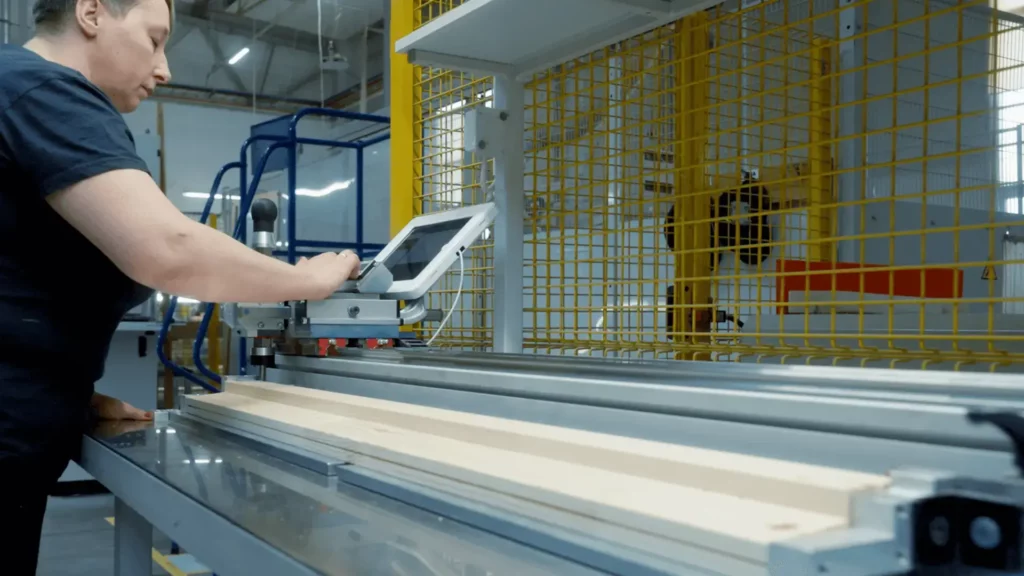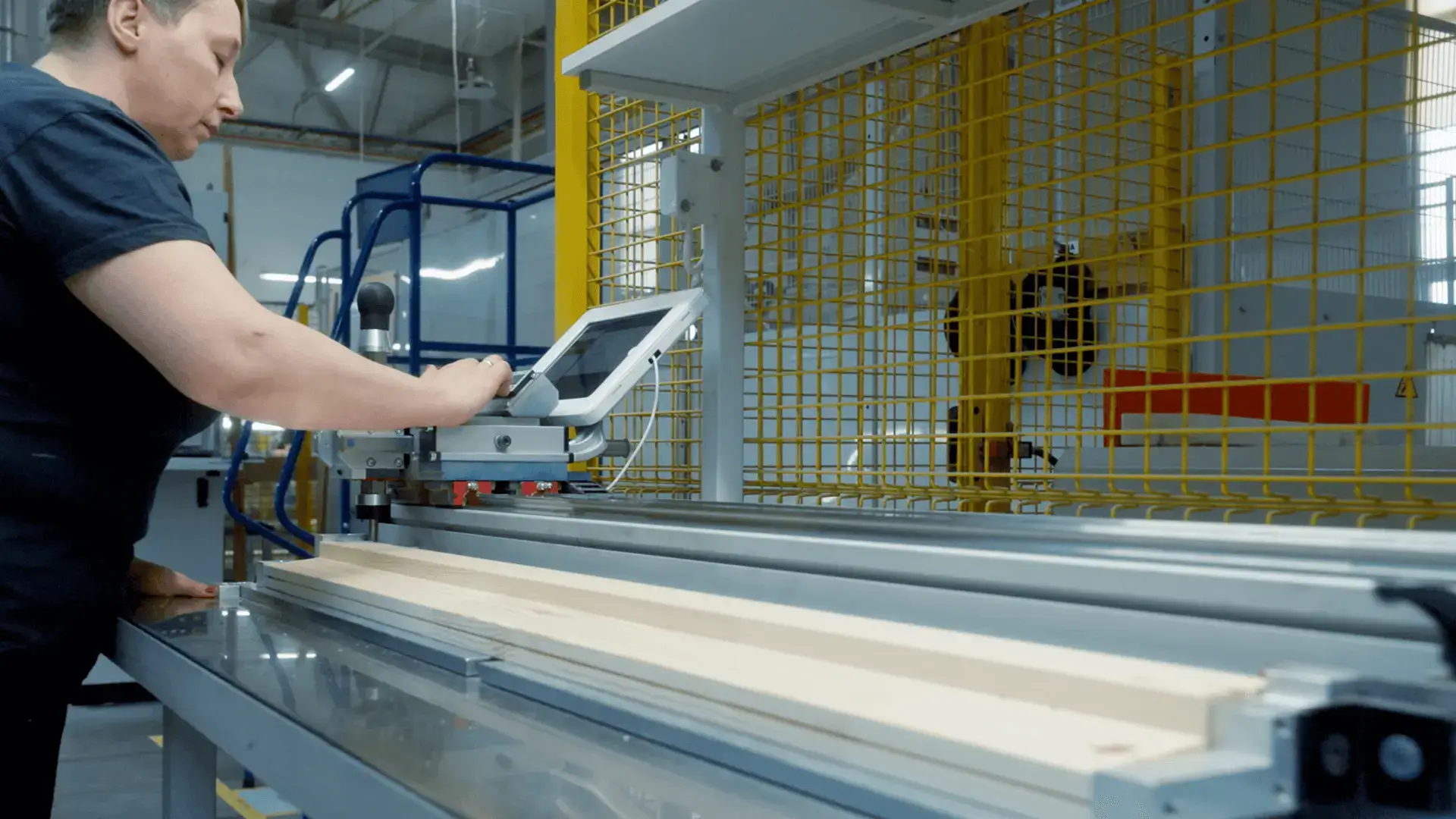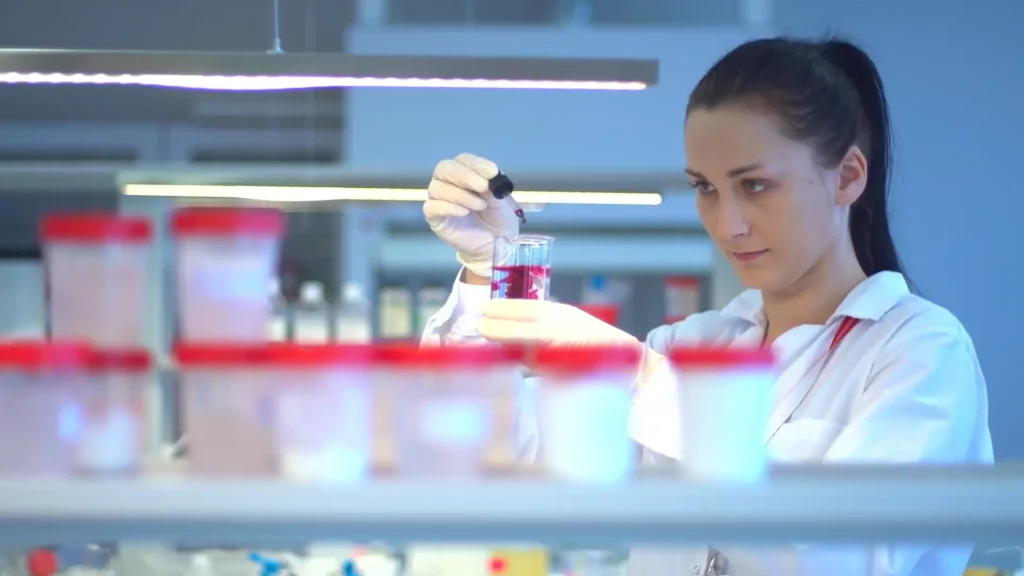
Towards Digital Transformation. How does the Digital Transformation Road Map show the development path in the production of cosmetics at MARION?
MARION Sp. z o.o. was founded in 1991 in Gdynia. The company initially specialized in the production of hair coloring paints and shampoos. In 2014, they opened a new factory with a total area of 7,000 sqm, including warehouses and on-site laboratories. This move has significantly increased their product range. Also, many quality standards were implemented, such as GMP (Good Manufacturing Practice), while the alignment of production with EU standards was confirmed by ISO certification.
Products of MARION have gained recognition in foreign markets – they are sold in over 30 countries. To acknowledge its many successes, the company has received many awards, including being honored twice with the Forbes Diamond (in 2021 and 2022), and three times with the Business Gazelle. MARION also pride oneself on British Retail Consortium, FSC CoC and Viiva certifications.
However, no one in the company intends to rest on their laurels. To meet the continuously growing demands of the competitive market, constant development is necessary, of which the digital transformation of the company is an inherent part. That is why MARION’s executive board decided to start a consultation project aimed at creating a Digitization Roadmap.
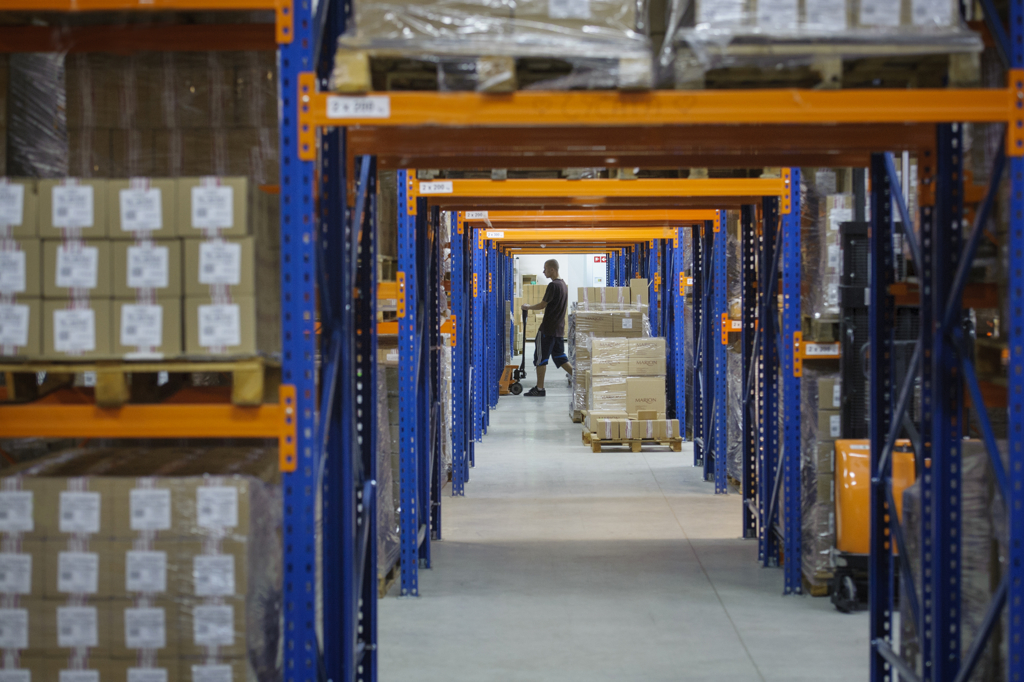
MARION warehouses. Source: MARION
What is a Roadmap?
We term a roadmap as an overall and very general outline plan designed for a large project, e.g. analytical or implementation plan. The key element of it is the specification of the strategic goal we want to achieve. The second element of the map is the description of the road leading to this goal, divided into sequentially implemented stages. By having such a map, all project participants can easily understand the vision and meaning of the project.
Simply put, a roadmap is a portfolio of tasks (sub-projects) and initiatives with all the relationships between them. Although the approach to its interpretation is open and the possibilities of its use are very wide. The map can be understood as a strategy for implementing the company’s transformation plan towards a modern factory. It can serve as a basis for a stepping stone to construction, revision or expansion of the strategy. It is often used to organize ideas and initiatives in the company, consequently transferring them into a specific set of named projects with specified priorities. The priorities themselves can be set due to various criteria: time, commitment or impact on the organization.
The roadmap describes a longer-term view
Notably, the maps, by virtue of the number of initiatives, their scale and timing are covering a longer time horizon – mostly about 3 to 7 years. Such a long perspective and a prioritization causes a natural selection and shift of projects and initiatives on the timeline. The roadmap cannot be treated thus as a fixed creation. The key to effective use of the roadmap is that it should live within the organization and be revised accordingly to the change of needs.
A typical roadmap may include the following elements:
- The current level of digital maturity of the company – where are we now?
- The main business goal of digital transformation – where do we want to be and why?
- List of initiatives (projects) supporting the achievement of the overarching goal – how do we want to do this?
- Business goals for each initiative – which initiatives to pursue?
- Relationships schema between initiatives.
- Pain – gain analysis of a set of initiatives.
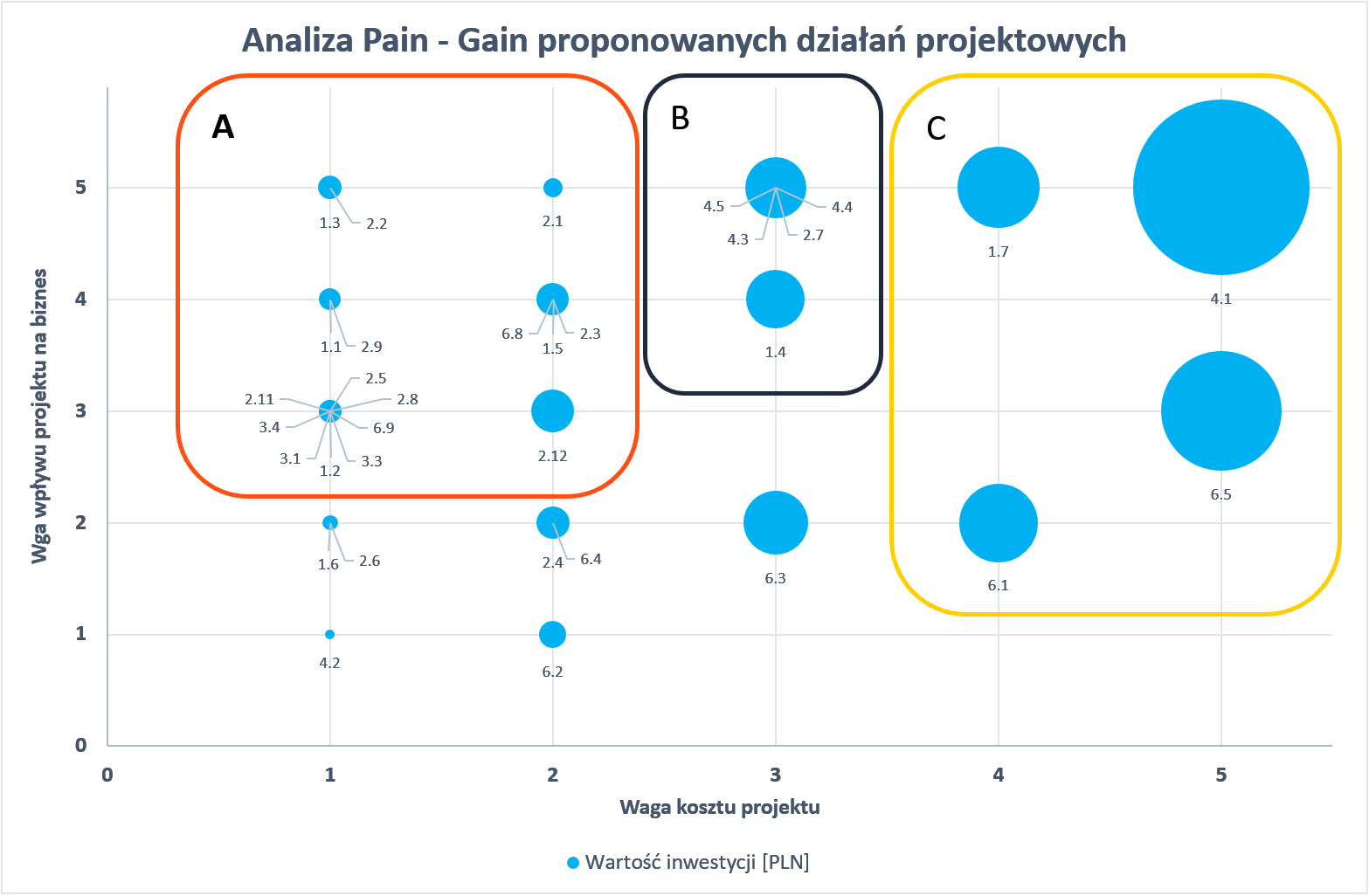
Effects of Pain – Gain analysis which were proposed to MARION. Source: ImFactory
Key drivers for a Digital Transformation
The digital transformation at MARION is not the goal itself. As a result, it is expected to provide significant benefits, the first of which is the increase in quality – understood both in terms of the product (simply seen as an increase in product quality) and in terms of the process (better quality of internal processes).
The second major benefit of adopting Industry 4.0 technology is to increase the efficiency of the organization, including cost effectiveness.
The third expected benefit is a productivity and process efficiency improvement, which will enable continuous increase in production volumes.
MARION Sp. z o.o. is a Polish cosmetics brand. It is an enterprise with exclusively Polish capital, belonging to the Family Firms Foundation (FFR). We have extensive experience and qualified staff, thanks to which we are able to quickly respond to the needs of demanding consumers and foreign contractors. The brand includes products such as body, hair and face cosmetics.
MARION is also a private label manufacturer. It offers full support and professional service at every stage of product development, from creating a recipe, through the production and confectioning of cosmetics (professional sachet, ampoule and bottle packaging or blistering).
Krzysztof Tański – CFO, project initiator
To achieve all of the above mentioned goals, changes in the business model are necessary. The Management and the Board of Directors of the company have defined them [this changes] as follows:
- Introducing the fullest possible measurement of a processes in the organization to ensure objective knowledge and support of the company’s continuous improvement activities.
- Increasingly broader definition of standards for the functioning of the organization in all its areas, in order to ensure repeatability, quality and effectiveness of operations.
- Deeper and more efficient use of the organization’s current and new IT systems to eliminate unnecessary administration, improve communication and offer new services to the company’s clients.
- Continuous improvement of customer service processes, resolved by creating a dedicated communication platform for business partners, based on new digital technologies, replacing the current formula based on a direct contact.
- Full tracking of orders (traceability), from the moment of placing them up to the moment of physical delivery of the products to the customer.
- Digitalization of the production area, which will provide access to all necessary data for a proper preventive actions and precise valuation of each action – along with fast and precise cost information for making market decisions which should be based on facts, not hunches (so-called evidence based management – EBM).
- Automation of the production process, always implemented on the basis of business analysis and potential benefit calculations.
- Automation of warehouse processes, both in the raw materials and finished goods areas. Its goal is to reduce the total cost of maintenance and boost efficiency.
- Capability and effectiveness upgrade in sales area by ensuring transparency, as well as records of activities and premises for decisions made.
The company is growing rapidly, this applies to all spheres of the organization’s life – management, production and sales. It became necessary to create a Digital Transformation Road Map that would collect in one place all the issues related to the future development of the Company in these aspects. The Road Map, on the one hand, informs us where we are, and on the other – where we want to be and what steps we need to take to achieve this goal.
While doing a market overview, we heard a lot of good about ImFactory, which is part of the ASTOR Group. The meeting with the company’s representatives reassured us that it was a very good choice. We did not have the right staff in our ranks to deal with this topic comprehensively. The final decision was made by the Management Board based on an internal recommendation from the Plant Director and the CFO. The experiences of other companies with which we became acquainted, influenced the choice of ImFactory as a partner in this project.
Tomasz Grzenia – Plant Director, Main User in a Project
The first stage of project related work consisted of meetings with Project Stakeholders, as well as representatives of major User groups. A comprehensive audit of the plant was also carried out. As a result, a number of deliverables were provided to the client, which included:
- ADMA report with a benchmark against enterprises in Poland and all ADMA survey participants. For more information on what ADMA is, visit our Industry 4.0 page.
- A set of a procedural observations and recommendations in the following structure: observation – diagnosis – suggestion [recommended change].
- A catalog of solutions and inspirations that can be applied in the process of digitalization.
- A collection of initiatives (projects) – with connections and dependencies between them – that make up the Digitalization Roadmap.
The initiatives presented ranged from tool [software] and technical solutions to recommended changes in the processes itself, as well as personnel and training recommendations. The analysis covered areas such as:
- monitoring of machines and equipment,
- production planning and scheduling,
- tracking WIP (Work-In-Progress),
- shopfloor and maintenance management,
- quality assurance and laboratory,
- logistics and warehousing.
The business case was of course a part of the collection of initiatives, as well as estimates of costs, complexity, implementation time and business impact – all in relation to to the 7th ADMA Transformations. The core item is the plan of further actions – recommended first steps and key long-term projects.
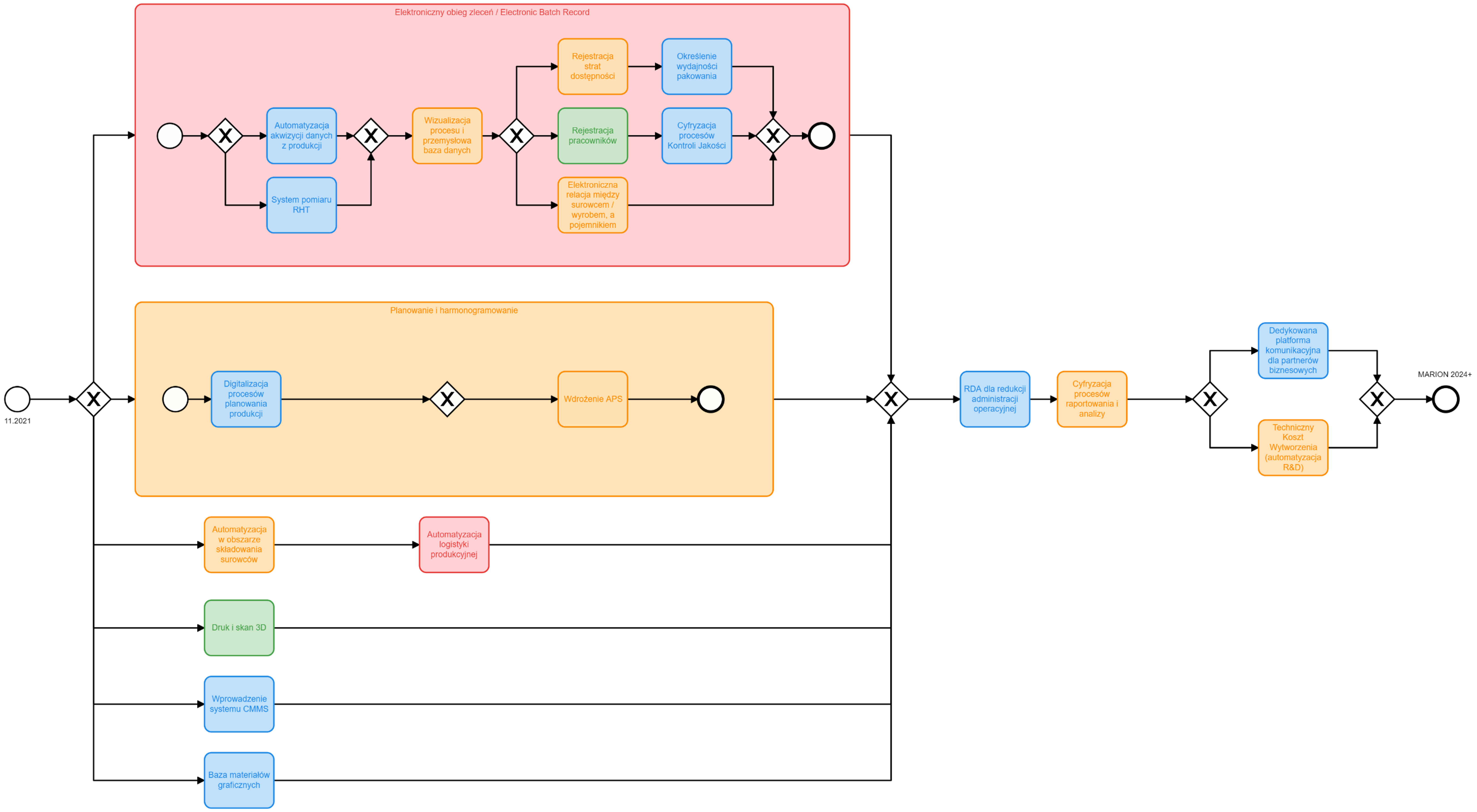
MARION’s Digital Transformation Road Map. Source: ImFactory
The Project Team was composed of representatives of all involved parties. On behalf of MARION, they were:
- Krzysztof Tański – CFO – Project Manager
- Tomasz Grzenia – Plant Director – Project Main User
- representatives of the User groups, including:
- Production Manager,
- Production Department Managers,
- Quality Department and Laboratory Managers,
- Warehouse and Logistics Managers.
From ImFactory’s side, the team included:
- Michal Zieliński – Partner, Digital Consulting. Project Manager
- Emil Chybciński – Specialist, co-executive.
The Substantive Partners were Artur Kolibski, Michał Matejczyk and Sławomir Łysik from the ENTRA Group.
The project was scheduled to run for 9 weeks, in several sequencial stages. The first one was a self-assessment of the company through an ADMA survey. After its completion, an audit (also called a scan) of the factory has been performed, supplemented by a series of interviews with employees – the purpose was to confirm the results of the self-evaluation. This stage ends with the submission of comments and process recommendations – at this point, the correctness of the collected information is verified, and the client may submit his comments.

Etapy projektu Mapy Drogowej. Źródło: ASTOR
Positive feedback allows us to move to the next stage – a roadmap building. The presentation of the finished Map is the next milestone. Based on the process comments and the Map, a final report is prepared.
One of the main sources of risk identified in the projects run by ImFactory is uncertainty. In the course of a few days of auditing at a facility, it is impossible to get to know absolutely all aspects of the factory’s operation.
There are certain techniques that help uncover hard-to-reach knowledge. An example may be holding meetings both in large groups, where different people and opinions are confronted with each other, as well as in a smaller subgroups or individual meetings, away from the ears and evaluating gazes of colleagues and superiors.
In the case of the project carried out at MARION, the problem of uncertainty was marginal thanks to the full commitment of all stakeholders who showed complete openness. This allowed for a thorough understanding of the functioning of the organization and effected in the more accurate observations and better tailored recommendations for changes. The results of the ADMA survey showed that MARION employees reliably approached to the self-assessment and that they see a great potential for changes in their organization.
In the case of consulting projects, two types of success can be identified. The first is long-term success – organizational changes and investments are made as a result of consultations, and the success of these initiatives is also the success of the consultation project that initiated them.
The second type is short-term success – this type of success focuses on the project’s ability to engage stakeholders, sparks a discussion, and initiate changes.
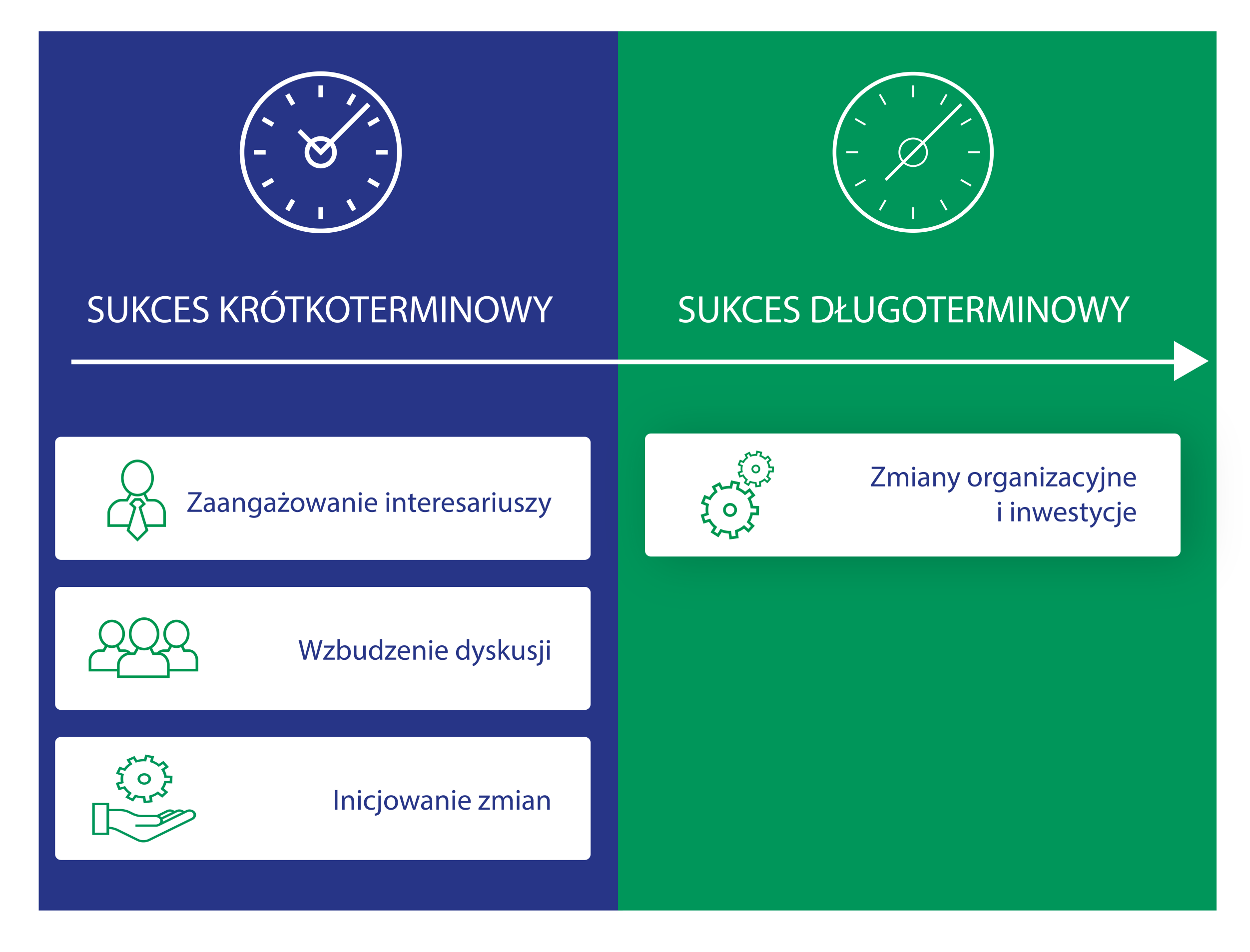 Success indicators of the consulting project. Source: ASTOR
Success indicators of the consulting project. Source: ASTOR
The long-term effects of the project are still difficult to fully assess – it is just too early for that. However, in the short-term perspective, full success has been achieved. Following the work carried out, implementation processes have been launched for the first initiatives, described as “low-hanging fruits”, that is, bringing tangible benefits at a low cost and effort.
But that’s not all, because the role of digital transformation in the company has increased, and in particular the digitalization of production, and therefore a new role has been created: the MES Solution Architect. An audit of the ERP system was also carried out be the producer, to optimize its operation and use to all of its capabilities, so that it fully supports the company in achieving the ambitious goals which have been defined.
The management of MARION confirmed the value of the delivered project results. The representatives of the company’s Management Board emphasized that ImFactory is the only company that not only presented its diagnoses and observations, but also proposed a realistic improvement and development plan.
MARION relies on digital technologies of Industry 4.0. It is necessary to meet the ever-growing market demands, as well as problems and inefficiencies identified by the Management Board and the Board of Directors. This applies not only to the production area, but also to all other areas of the organization’s functioning.
Changes at MARION are still underway and it is too early to comprehensively evaluate their results. The most important thing is that the topics related to the digitalization of production have become one of the main aspects of the company’s development. Awareness in this regard among the company’s management and employees is higher than ever before, and the Management Board’s support means that further changes can be carried out more quickly and efficiently. As a result of the work done so far, it has become clear to everyone that digitalization of the company is essential for its further development and is an imperative condition for it.

Author:
Michał Zieliński
A graduate of Automation and Robotics and postgraduate of Lean Six Sigma Black Belt studies at the Gdańsk University of Technology. Partner at ImFactory, Project Manager, Head of the Digital Consulting Department. In the ImFactory team, he is responsible for building a vision for the development of IT systems in production environments and evaluating the level of digital maturity of enterprises along with planning their digital transformation path. The projects carried out range from installations intended for supervision and monitoring, to the implementation of complete integrated production management systems.
See also
Want to learn more? Visit our Knowledge Base, where you'll find articles and webinars by experts to expand your knowledge.
Check if Digital Transformation is the Answer to Your Company's Needs
The Free Consultation Process:


























